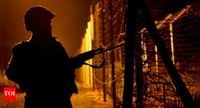On Wednesday, May 7, 2025, Giani Kuldeep Singh Gargaj, the Acting Jathedar of Sri Akal Takht Sahib, condemned the shelling in Jammu and Kashmir’s Poonch, which resulted in the deaths of Sikh community members and damage to a gurdwara. The attack, which left at least 10 civilians dead and 40 injured, was described by Gargaj as a "blow to humanity." He called for both India and Pakistan to reduce tensions, emphasizing that diplomatic efforts must prevail over military actions. "Both governments must act with wisdom, not weapons," he stated.
Initial reports indicated that the shelling was a response by Pakistani troops to India’s Operation Sindoor, which targeted terrorist infrastructure across the border. The deceased included Bhai Amreek Singh, a soldier, Bhai Amarjeet Singh, a retired army veteran, and Bhai Ranjit Singh, a local shopkeeper. Additionally, a Sikh woman, Bibi Ruby Kaur, lost her life in the Manakot area. "Since 1947, this conflict has caused suffering, including to Hindus and Sikhs near the border. How many more must pay for a conflict they did not create?" Gargaj lamented, underscoring the need for peace amidst ongoing violence.
In the wake of the shelling, many families in Poonch began fleeing toward Jammu, seeking safety amid fears of further violence. Narinder Singh, President of the District Gurudwara Prabandhak Committee, reported that nearly 12 people had died due to the cross-border shelling, including five from the Sikh community and the rest from the Muslim community. He noted that a shell had struck a corner of Gurudwara Shri Guru Singh Sabha, damaging a door and shattering glass.
The ongoing violence has drawn sharp condemnation from various political figures. Shiromani Akali Dal chief Sukhbir Singh Badal condemned the attack on the gurdwara, expressing solidarity with the bereaved families and demanding adequate compensation for their loss. "Strongly condemn the inhuman attack by Pakistani forces on the sacred Central Gurdwara Sri Guru Singh Sabha Sahib in Poonch, in which three innocent Gursikhs lost their lives," Badal stated on social media.
As tensions escalated, Defence Minister Rajnath Singh highlighted the Indian Armed Forces' actions during Operation Sindoor, which reportedly targeted nine terror camps in Pakistan and Pakistan-occupied Kashmir (PoK). Singh emphasized that the operation was carried out with precision and sensitivity to avoid civilian casualties. "Our armed forces displayed their valour and bravery, scripting a new history," he said, acknowledging the loss of life in Poonch while asserting that the military response was necessary to deter further attacks.
Following the Pahalgam terror attack, which claimed 26 lives, the Indian government initiated Operation Sindoor as a direct response to the escalating threat of terrorism. Singh detailed that the operation was executed with surgical precision, ensuring that civilians were not harmed. The strikes targeted key infrastructure belonging to terrorist organizations such as Jaish-e-Mohammed and Lashkar-e-Taiba.
In response to the cross-border shelling, the Indian Army has maintained a vigilant stance along the Line of Control (LoC), with local units instructed to provide appropriate responses to any provocations. The ongoing conflict has led to significant panic among residents in border areas, prompting emergency measures from local authorities.
Former Vice President M. Venkaiah Naidu expressed national pride in the armed forces' operation, stating, "The entire nation is proud of our Armed Forces who conducted Operation Sindoor with precision strikes on terror targets to demonstrate that Bharat has zero tolerance for terrorism." Meanwhile, India's Chief Minister Omar Abdullah held an emergency meeting to address the situation in border areas, reinforcing the need for coordinated efforts to ensure civilian safety.
As the conflict continues to unfold, international reactions have also emerged. Countries such as Singapore have advised their citizens to avoid travel to the India-Pakistan border due to the volatile security situation. Meanwhile, Russia and other nations have called for de-escalation and diplomatic engagement between the two countries.
The recent violence, particularly the shelling in Poonch, underscores the ongoing humanitarian crisis faced by civilians caught in the crossfire of geopolitical tensions. Jathedar Gargaj, in his address, urged both nations to prioritize peace, stating, "War always harms humanity severely, often resulting in the deaths of many innocent people. Therefore, every possible effort must be made to resolve the current situation peacefully." He called for prayers for the victims and their families, emphasizing the need for unity and support among those affected.
As the situation develops, it remains crucial for both governments to engage in meaningful dialogue to prevent further loss of life and to restore peace in the region. The voices of community leaders like Jathedar Gargaj and political figures like Badal reflect a growing demand for compassion and understanding amidst the chaos of conflict.
In light of these events, the urgent need for a diplomatic resolution to the longstanding tensions between India and Pakistan has never been clearer. The lives lost in Poonch serve as a stark reminder of the human cost of war and the imperative for both nations to seek paths toward reconciliation and peace.

